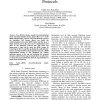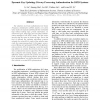137
click to vote
JCM
2008
15 years 2 months ago
2008
Two effective attacks, namely de-synchronization attack and impersonation attack, against Ha et al. 's LCSS RFID authentication protocol, Song and Mitchell's protocol are...
118
click to vote
UCS
2004
Springer
15 years 7 months ago
2004
Springer
Today’s RFID protocols that govern the communication between RFID readers and tags are solely optimized for performance, but fail to address consumer privacy concerns by support...
126
click to vote
WPES
2005
ACM
15 years 7 months ago
2005
ACM
Radio Frequency Identification (RFID) technology raises significant privacy issues because it enables tracking of items and people possibly without their knowledge or consent. O...
120
click to vote
INFOCOM
2007
IEEE
15 years 8 months ago
2007
IEEE
Abstract— This research focuses on RFID-based 3-D positioning schemes, aiming to locate an object in a 3-dimensional space, with reference to a predetermined arbitrary coordinate...
153
click to vote
WIMOB
2008
IEEE
15 years 8 months ago
2008
IEEE
— Recently, the RFID tag system is paid attention to as an identification source. Each RFID tag is attached to some object. With the unique ID of RFID tag, a user identifies the ...
143
click to vote
PERCOM
2007
ACM
16 years 1 months ago
2007
ACM
The objective of private authentication for Radio Frequency Identification (RFID) systems is to allow valid readers to explicitly authenticate their dominated tags without leaking...


